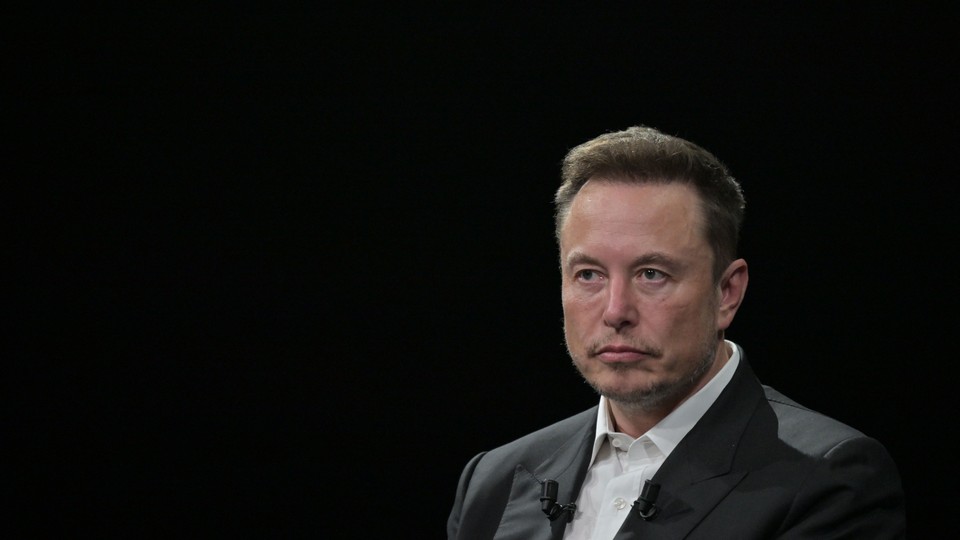Elon Musk’s Big Tesla Campaign
5 min read
This is an edition of The Atlantic Daily, a newsletter that guides you through the biggest stories of the day, helps you discover new ideas, and recommends the best in culture. Sign up for it here.
Tesla fueled Elon Musk’s ascent to astronomical wealth and fame. But now, as he lords over six companies and continues to grow his empire, will Tesla go from crown jewel to just another project?
First, here are three new stories from The Atlantic:
- A wild plan to avert catastrophic sea-level rise
- The mystique of Ozempic is growing.
- Tom Nichols: Let’s talk about Trump’s gibberish.
“An Asset and a Liability”
Elon Musk is rallying his supporters. In recent weeks, Musk has been posting on X pushing investors to vote on a pay package that a judge threw out in January, in part for board members’ failures to disclose potential conflicts of interest. He has dangled a Tesla-factory tour in front of those who vote, and declared that those who vote against him are “oathbreakers.” In January, he threatened to take his AI talents elsewhere if Tesla doesn’t give him what he wants. We will learn tomorrow whether shareholders support his pay package—stock payouts worth an estimated $46 billion.
Back in 2018, when Tesla was just a slice of its current self, its board agreed to give Musk—who does not receive a salary—a major chunk of the company if he hit certain ambitious milestones such as pushing its market capitalization to $650 billion. “Musk met all of those benchmarks and did so early,” Christina Sautter, a law professor at Southern Methodist University, wrote in an email. (The company’s value has since fallen under that mark.)
At this point, Musk is “both an asset and a liability” to the company that made him a billionaire, Margaret O’Mara, a historian at the University of Washington who studies Silicon Valley, told me. “Tesla is what it is because of Elon and because of his outsized persona,” she said. Musk’s public image—or “the Elon mystique,” as O’Mara called it—was key to cranking up Tesla’s stock price (its stocks have tumbled recently, but are still dramatically higher than they were in 2018). His volatile behavior and propensity for posting about controversial issues, often in offensive ways, may alienate customers. Still, O’Mara said, Musk seems to think that Tesla needs him more than he needs Tesla.
That may be true. Musk’s attention has lately been divided: He keeps himself busy through a well-documented array of personal, political, parental, and business entanglements. Tesla is now just one of several companies in the “Muskonomy” over which he presides, which includes SpaceX and X, and he has in recent years diverted staff and resources from Tesla to other firms.
Things have been bumpy at Tesla this year—the aging company has seen layoffs, recalls, and dipping sales as competitors start to catch up in the electric-vehicle market it helped create. Its long-anticipated Cybertruck has faced various technical issues, and in April, the company agreed to recall some 4,000 of them. Still, the Tesla board—stocked with Musk allies—supports his pay package, openly attempting to use it to help keep his eye on the ball. “If Tesla is to retain Elon’s attention and motivate him to continue to devote his time, energy, ambition and vision to deliver comparable results in the future, we must stand by our deal,” the director of the Tesla board wrote in a letter to shareholders. “This is obviously not about the money,” she added (a statement that struck me as not so obvious given the amount of money involved). Tesla did not immediately respond to a request for comment.
Musk may not need that money—his shares in Tesla, even if his 2018 pay package is not reinstated, are worth well over $70 billion—but he wants it. Though it’s not clear if a show of shareholder support in tomorrow’s vote would actually sway the judge to overturn her past ruling, that’s what he and his allies are aiming for. Musk is facing pushback: Some financial advisers have counseled their clients to vote no, and the California Public Employees’ Retirement System, a massive pension fund, has signaled that it would vote against the compensation. The $1.7 trillion Norwegian sovereign wealth fund, Tesla’s eighth-largest shareholder, has also said that it would vote no. Musk, responding to the news on X, deemed that decision “not cool.”
But he has the board behind him, and some powerful shareholders too. As one investor in favor of the pay package argued, “Tesla is Elon.” What’s less clear is whether Elon is Tesla—or if his ambitions have swelled beyond the brand that accelerated his fame.
Related:
- Elon Musk is spiraling. (From 2023)
- Demon mode activated (From 2023)
Today’s News
- The House voted to hold Attorney General Merrick Garland in contempt of Congress for refusing to provide audio recordings from Special Counsel Robert Hur’s interview with President Joe Biden.
- The Southern Baptist Convention, the largest Protestant denomination in the U.S., voted against the use of in vitro fertilization.
- Oklahoma Supreme Court upheld a lower court’s decision to dismiss a lawsuit that called for the last known survivors of the 1921 Tulsa Race Massacre to be compensated for damages.
Dispatches
- The Weekly Planet: Soon, a million-mile electric vehicle may be a reality—if car companies will let it happen, Matteo Wong writes.
Explore all of our newsletters here.
Evening Read

The Constitutional Case Against Exclusionary Zoning
By Joshua Braver and Ilya Somin
America is suffering from a severe housing shortage, and one of the main culprits is exclusionary zoning: regulations that restrict the amount and type of housing that property owners are allowed to construct on their land. Exclusionary zoning slows economic growth, severely limits economic mobility, and imposes burdens that disproportionately fall on racial minorities.
No one simple solution to this problem exists. But a crucial tool may lie in the Constitution.
Read the full article.
More From The Atlantic
- Brian Klaas: Trump rants about sharks, and everyone just pretends it’s normal.
- Quinta Jurecic: Trump’s one constant
- Can a robot map a planet as well as a human can?
- Photo: Scenes from China’s 2024 Dragon Boat festival
Culture Break

Read. These eight books dispense practical advice if you’re in a creative slump.
Watch. Richard Linklater’s 2011 film, Bernie (available to stream on Tubi), understands the dangers of despising people who are not like you.
Play our daily crossword.
P.S.
Many of Elon Musk’s extracurricular activities are closely tied to his business interests. As The New York Times reported last month, his relationships with right-wing world leaders have helped him reap business advantages in new markets: ”No other American megabillionaire businessperson has so publicly fostered ideological relationships with world leaders to advance personal politics and businesses.”
— Lora
Stephanie Bai contributed to this newsletter.
When you buy a book using a link in this newsletter, we receive a commission. Thank you for supporting The Atlantic.



